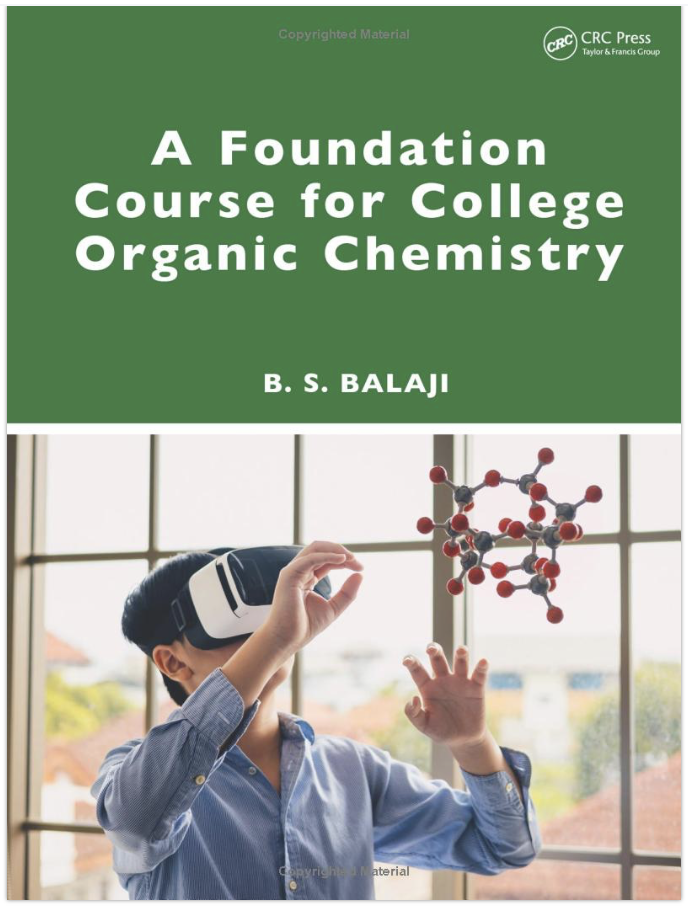When someone asks, “is teaching your profession?” I say it is my passion. My teaching philosophy revolves around concept-based teaching and how to take the students away from rote learning. We have been toiling with the idea of how to effectively instil critical thinking to our students. To this end we have been using open book examination and project-based evaluation. I use several analogies, mnemonics, molecular model, video lectures to teach. Here I list out the courses I have taught and currently teaching.
I am an ardent proponent of online and digital education. In addition to offline (physical) classes, I am also engaged in online (digital) teaching. I have been running a successful massive open online course in organic chemistry for M.Sc. students in the SWAYAM platform. This project was funded by Ministry of Human Resource Development (currently Ministry of Education). So far 18,800 learners had registered for the course. (You can see the media coverage here).
Even before the COVID-19 forced online teaching learning process, I was teaching our Bioorganic chemistry course online. In fact, I was the first one to launch a full-fledged online course using JNU-LMS platform. (You can see the media coverage here).
I have initiated a national campaign to support rural and remote area students to learn using television during the COVID-19 pandemic. With support from Prof. Mangala Sunder Krishnan, IIT-Madras and funding from Ministry of Education we have successfully created learning materials for the students. (You can see the media coverage here).
Offline Courses
Jawaharlal Nehru University
For M. Sc. & Ph.D (2015 - )
- BT121- Bioorganic chemistry
- BT223- Chemical biology
- M. Sc. Dissertation
- BT651 Research methodology (2016-2018)
- BT238 Seminar (2022 - )
- IT466 Chemical Foundation for Bioinformatics (2021 - )
- BT236- Critical analysis of classical papers (2023 - )
Online Courses
SWAYAM MOOC in Organic chemistry 1 has been translated into 8 Indian languages. click here to know more
SWAYAM MOOC
We have been successfully running a massive open online course (MOOC) supported by Ministry of Education.
Swayam Prabha
The main objective of the SWAYAM Prabha project is to reach rural (remote) population where the internet and mobile penetration is very less.
SWAYAM MOOC
We have been successfully running a massive open online course (MOOC) supported by Ministry of Education.
Swayam Prabha
The main objective of the SWAYAM Prabha project is to reach rural (remote) population where the internet and mobile penetration is very less.
Book

Publisher: CRC Press; 1st edition
ISBN: 9781032631141
Amazon
Barnes & Noble
A Foundation Course for College Organic Chemistry
To understand and improve the underlying principles that govern how organic reactions occur, A Foundation Course for College Organic Chemistry follows a brick-by-brick building approach. Emphasis is given to interrelating experimental facts and findings with predictions (mechanism) and inferences (results). Discussions focus on clarifying how complex organic reactions occur, which is based on electronegativity differences, movement of electrons (through σ framework or π bonds), and addition or removal of atoms (hydrogen, halogens) or groups (hydroxy, amino). The book begins with simple rules governing the deconstruction of reactions and applies them to explain how esterification, amide, and cyanide hydrolysis reactions proceed. The importance of stereochemistry (used in drug development, biology, and medicine), aromatic electrophilic and nucleophilic substitutions, reaction kinetics, and dynamics is explained with suitable examples.
Features:
- A systematic and structured approach is used to study all aspects of reactive intermediates (generation, structure, geometry, and reactions of carbocations, carbanions, and carbon-free radicals)
- This book incorporates scientific methods to deduce reaction mechanisms with simple and relevant explanations, and limitations
- A proper explanation is given to understand the influence of functional groups on the stability and reactivity of intermediates, pKa, HSAB principles, structure-activity relations, and how these can be exploited in organic chemistry
- Information is presented in an accessible way for students, teachers, researchers, and scientists